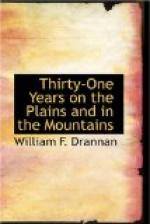After looking around some little time I found Jim Bridger in a saloon so drunk that he could scarcely walk. I asked him where Johnny West was, and the bar-keeper told me that the police had taken him to the station-house. I asked what for, and he said for trying to shoot some one.
I watched for an opportunity and took both of Jim’s pistols and knife away from him and gave them to the clerk at the hotel. Afterwards I walked to the station-house to see what the charge was against Johnny West. The man told me the charge was drunk and disorderly and shooting a pistol inside of a house. I asked him if he would let Johnny out if I would pay the fine. He said: “Yes. As soon as he is sober to-morrow morning, you can come around. The charges will be twenty dollars.”
If the reader ever had any experience with a drunken man, which to me is the most disgusting thing on earth, he can realize something of the time I had with those two men, for it took me all the next day to get Johnny West home and get him reconciled.
He was determined to return to Sacramento, and it took me two more days hard work and coaxing to get Jim Bridger home. I have it by good authority that this was the last drunken spree that Johnnie West ever took. He remained on his ranch some six years longer and having accumulated considerable wealth, sold out for a good price and returned home to his relations in Texas, and there died a short time afterwards;
Jim Bridger and myself stayed at Johnny’s until about the middle of January. This now being 1861, we started for New Mexico, via Los Angeles, with the intention of laying over in Los Angeles until we could cross the Rocky Mountains. There was a good wagon road from Sacramento to San Jose, and from San Jose to Los Angeles.
At this time the Indians were all peaceable through California, the only trouble with them was their begging. At that I think, beyond any doubt, that they could beat any class of people it has ever been my misfortune to meet.
We arrived at Los Angeles on the fifth of February. It being one of the Spanish feast days, they were having a great time. The Spanish population of this place having now become reconciled, we were treated with due respect while we remained here, being about one week, during which time we lived on fruit. For here were fruits and flowers, world without end. Beyond any doubt, this is the greatest place for flowers that I have ever seen.
Soon we pulled out for New Mexico, keeping on the north side of the Colorado river until above the head of the Grand Canyon, this being pretty well up in the Rocky Mountains, and here near the head of the Grand Canyon we began to see more or less Indian sign, but we were undecided as to what tribe of Indians they belonged.
The second day after crossing the Colorado river we ran on to a band of Indians, but to our satisfaction they were of the Pima tribe, and the same young Indian whose sister had assisted me in rescuing the white girl Olive Oatman, was with them.




